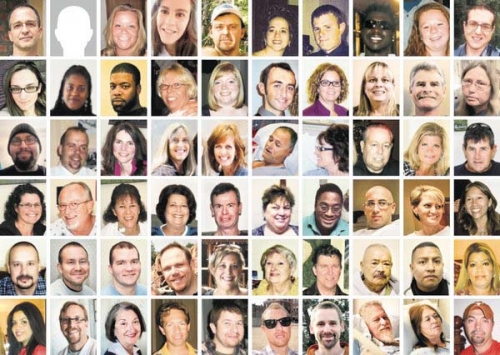Losar Tashi Delek! With Losar, the Tibetan New Year, celebrated this past Wednesday there is no better time to bring up a topic that has been sadly neglected on the Tricycle blog: Tibetan self-immolations. In the past year over twenty Tibetans have set themselves on fire to protest Chinese government occupation and all that comes with it—”patriotic re-education,” unmerited arrests, attacks on monasteries and nunneries, a ban on photos of the Dalai Lama…the sad list of human rights violations in Tibet is a long one.
Phayul, a pro-Tibetan independence news outlet based in Delhi, reported on Wednesday that despite a general Tibetan sentiment to boycott Losar celebrations in tribute to the self-immolators, Chinese authorities in Tibet “issued orders requiring Tibetan officials and the general public to prepare song and dance routines for Losar.” Nothing like forced merriment, huh?
On the same day, Phayul also reported, three Tibetans began an indefinite fast in front of UN headquarters in New York, hoping to put pressure on the UN to send a “fact-finding delegation to Tibet.”
Without attention from the mainstream media, however, it is unlikely that this will occur. Although it was refreshing to see Tibetan concerns being covered by NPR and Time this week (twice in Time, actually!), the damage that is done by not allowing the international media into Tibet to independently confirm stories and speak with sources is monumental. Here’s hoping that this New Year, although it seemed to have been rung in with sadness, brings progress to the Tibetan cause.
A story from the New York Times this week has been catching some attention from Buddhist Tweeters: “60 Lives, 30 Kidneys, All Linked,” a story about compassion and the significance of cause and effect if there ever was one. To summarize it quickly, Rick Ruzzamenti, a Tibetan Buddhist, set off a chain of kidney donations when he randomly decided to give his kidney to a total stranger. (In the piece, he credits the practice of tonglen as an influence for doing so!)
Although many people who need kidneys are surrounded by family and friends who are willing to donate one so that they may live, often their blood types do not match or other medical complications prevent the donation from happening. In chains such as the one Ruzzamenti started, these donors agree to instead give their kidneys to a blood-type-compatible stranger; in return, their loved ones receive a kidney from another stranger in the chain. The one Ruzzamenti began in total included 60 people and saved 30 lives:

The kidney donors and recipients of the Ruzzamenti donation chain
One particularly striking thing about the story was the shock with which Good Samaritan donors such as Ruzzamenti are treated:
Until recently, hospitals regularly turned away Good Samaritan donors on the working assumption that they were unstable. That has changed somewhat with experience. But when Rick Ruzzamenti showed up at Riverside Community Hospital asking to give a kidney to anyone in need, he still underwent rounds of psychological screening as well as medical tests.
The doctors and social workers did not know what to make of Mr. Ruzzamenti at first. He had a flat affect and an arid wit, and did not open up right away. As the hospital’s transplant coordinator, Shannon White, pressed him about his motivations and expectations, he explained that his decision seemed rather obvious.
“People think it’s so odd that I’m donating a kidney,” Mr. Ruzzamenti told her. “I think it’s so odd that they think it’s so odd.”
The hospital wanted to make sure that he was not expecting glory, or even gratitude. Mr. Ruzzamenti stressed that no one should mistake him for a saint.
Way to go, Ruzzamenti! He is absolutely right: it’s a bit depressing that we live in a time in which it is so surprising that someone should perform an act of compassion with no reason except for the fact that he wanted to help.
Speaking of helping others, I was mulling over a comment from last week’s Buddha Buzz this entire week, which asked what Buddhists should do when faced with atrocities—especially atrocities occurring in very distant places. I don’t know the answer to this. But I do know that it’s easier—and sometimes, more beneficial—to instead concentrate on what you can do for those in need who are a little bit closer to home. As a perfect example, a Laotian Buddhist temple in Colorado that burned to the ground two months ago is in the midst of fundraising so that they can rebuild it. You can donate to their cause here. Many hat tips to arunlikhati of the Angry Asian Buddhist blog for covering this since the fire, and also to Fox 31 Denver, where the video below comes from.
Thank you for subscribing to Tricycle! As a nonprofit, we depend on readers like you to keep Buddhist teachings and practices widely available.